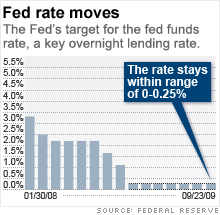Fed: Economic activity has 'picked up'
Central bank leaves rates near zero. Says the economy is showing signs of improvement and inflation remains subdued.


NEW YORK (CNNMoney.com) -- The Federal Reserve kept interest rates near zero on Wednesday and said the economy is improving. But the Fed also pointed out ongoing job losses could dampen a recovery.
At the conclusion of its two-day meeting Wednesday, the Federal Open Market Committee said that the government's stimulus and economic rescue actions have helped to stabilize the financial markets, which will help generate economic growth in the future.
"Economic activity has picked up following its severe downturn. Conditions in financial markets have improved further, and activity in the housing sector has increased," the Fed said in a statement. It was the first time since August 2008 in which the FOMC said the economy had improved from its previous meeting.
Meanwhile, the Fed said consumer spending is stabilizing, but that rampant job loss and tight credit has restrained overall household consumption. The Fed added that although the housing sector has begun to make a comeback, home sales and new home construction are coming off of historic lows.
As a result, the Fed kept its federal funds rate, an overnight lending rate that guides rates on various consumer and business loans, in a range of 0% to 0.25%. Rates have been at that level since December.
Stocks initially rose following the Fed's announcement but headed lower by the end of the day. Bonds were also mixed. The dollar pulled back, nearing a one-year low.
Last week, Federal Reserve chairman Ben Bernanke said that he thought the recession was "very likely over." But the Fed reiterated Wednesday that "economic conditions are likely to warrant exceptionally low levels of the federal funds rate for an extended period." That's in spite of its forecast of a looming recovery.
"I'm not so sure they're going to be able to keep that line [in future statements]," said Mark Vitner, economist at Wells Fargo. "They'd like to until the economy is firm enough that they don't scare people when they talk about the need to raise rates. But the economy is looking a little bit better, and they may have to back off sooner than they'd like."
Nonetheless, the Fed said it would extend one of its rescue programs, the $1.45 trillion of mortgage-backed securities and debt purchases from Fannie Mae (FNM, Fortune 500) and Freddie Mac (FRE, Fortune 500), into the first quarter of 2010. It previously was scheduled to end those purchases at the end of this year.
But the Fed didn't renew the program as some economists had expected.
Vitner said the Fed likely would have renewed it if there weren't signs of improvement in the housing sector. He argued that the Fed likely extended the phase-out period until the spring of 2010 so the central bank wouldn't shock the housing sector with a sudden exit.
In addition, many economic forecasts have unemployment reaching its peak at the end of first quarter, and Fed programs will likely be needed to help support the economy through that period of job loss.
"We are seeing the exit strategy in motion," said Sung Won Sohn, professor of economics at California State University. "The FOMC is trying to balance its support for the weak economy and budding inflation concerns, and their answer is to phase out some of these purchase programs but make sure the economy has plenty of liquidity by keeping rates low."
Still, the central bank continues to oversee dozens of economic rescue programs that have added about $1 trillion to its balance sheet. The Fed said those programs have helped the economy rebound, but many experts believe the initiatives could contribute to out-of-control inflation if they are not pared back in time.
The Fed did note recent commodity price increases in its statement but added that it saw little threat of inflation in the near term. ![]()

